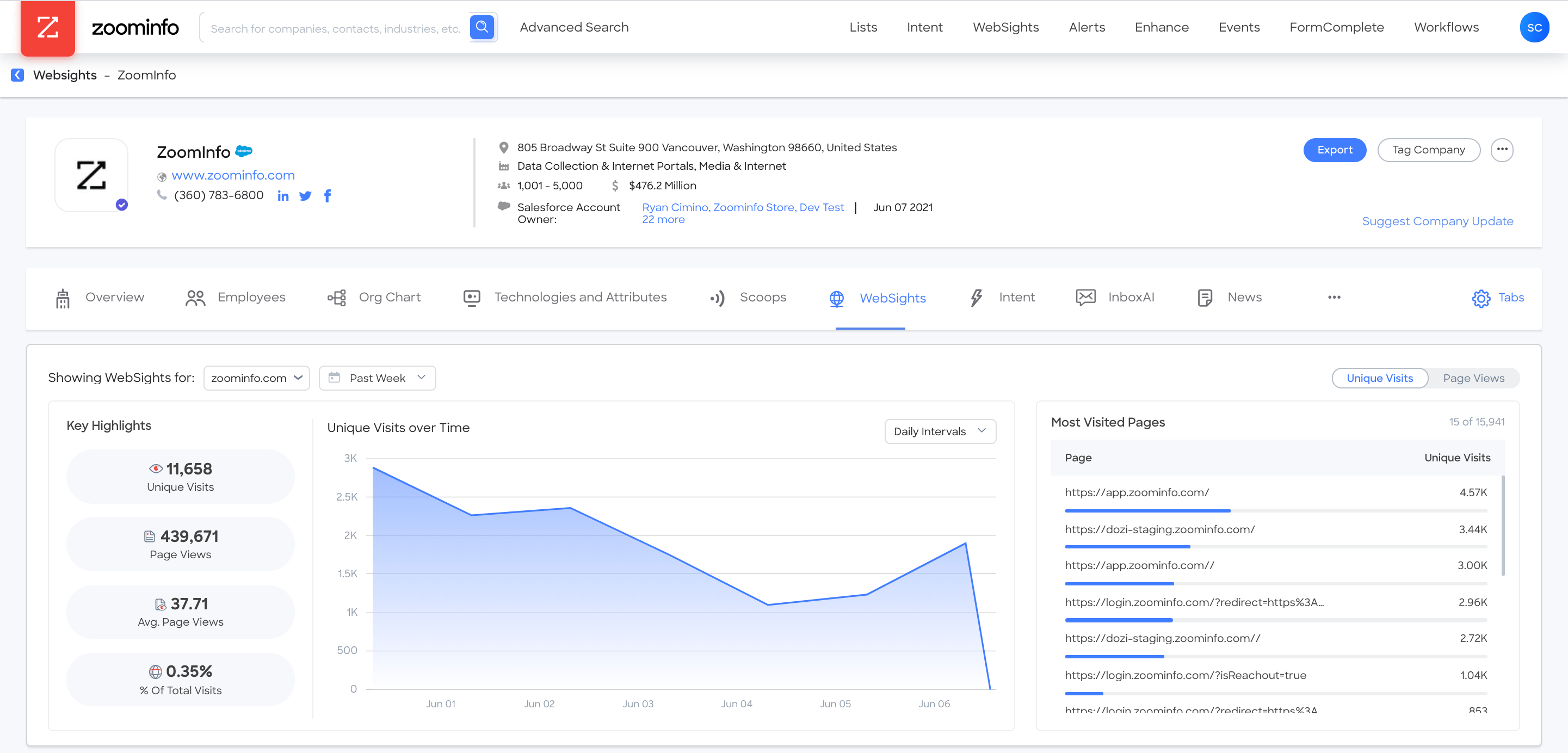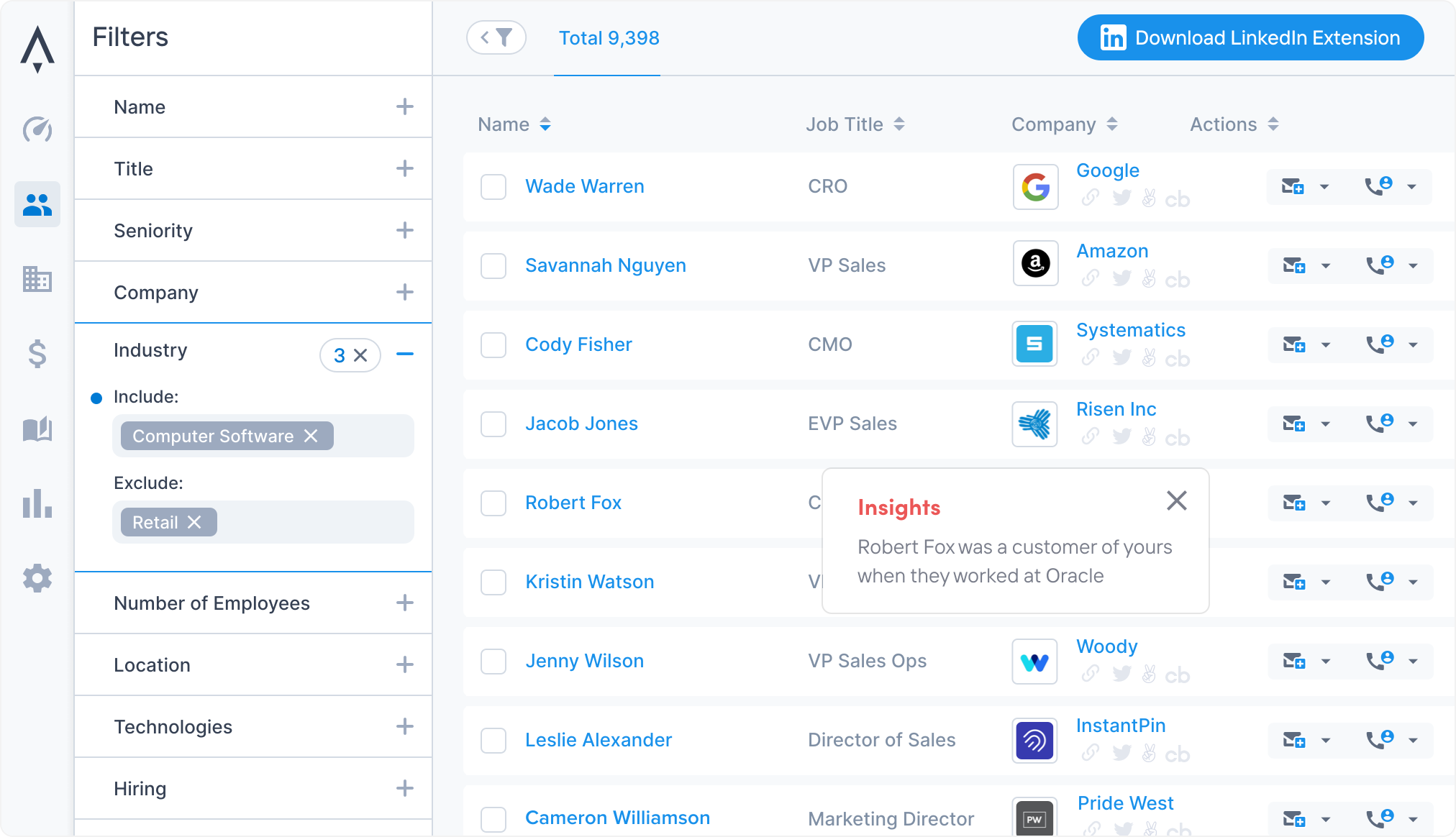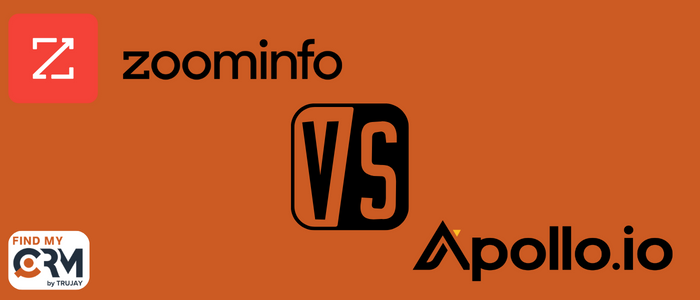What is ZoomInfo?

ZoomInfo is a subscription-based SaaS company that provides access to its database of business information and contacts. It offers a platform for sales, marketing, and recruiting professionals to gather intelligence about companies and individuals.
ZoomInfo collects data from various sources, including publicly available information, company websites, social media, and other online sources. The platform allows users to search for specific companies, industries, or individuals and provides detailed profiles with contact information, company details, job titles, and other relevant data. This information can be used for lead generation, prospecting, sales outreach, market analysis, and more.
[Related article: CRM Database: What it is and How to Make]
By the way, you can also consider these powerful CRM options for your business for different industries:
-Mar-27-2024-12-03-10-0664-PM.png)
Pipedrive
Pipedrive CRM is a user-friendly platform that is effortless to master. It is the creative web designer's secret weapon in the world of Customer Relationship Management.
-Mar-27-2024-11-59-56-4325-AM.png)
monday sales CRM
Let monday sales CRM do the grunt work while your team stays focused on high-level tasks, such as creative projects, business strategy, and relationship building.
-Mar-27-2024-12-03-07-6108-PM.png)
Zoho
It is a web-based email marketing management service for small and medium businesses. It automates the entire marketing process - from managing your email marketing campaign to maintaining mailing lists.
-Mar-27-2024-11-44-09-2689-AM.png)
Salesforce
Salesforce is an industry leader known for its mammoth feature set and endless customization options. The platform can adapt to any industry, from manufacturing to insurance.
ZoomInfo Key Features
Here are some key features of ZoomInfo:
- Comprehensive Database: ZoomInfo offers access to a vast database of business information, including company profiles, contact details, job titles, and more.
- Advanced Search Functionality: Users can search the ZoomInfo database using various filters and criteria to find specific companies, industries, or individuals that match their criteria.
- Accurate Contact Information: ZoomInfo provides accurate and up-to-date contact information for key decision-makers and influencers within companies, enabling users to reach out to the right people.
- Real-time Updates: The platform's database is constantly updated with fresh information, ensuring that users have access to the most recent data.
- Prospecting Tools: ZoomInfo offers prospecting tools that help users identify and target new leads based on specific criteria such as industry, company size, revenue, and more.
- Sales Intelligence: ZoomInfo provides insights and intelligence about companies and individuals, including news mentions, funding announcements, organizational changes, and more, helping users to tailor their sales pitches and outreach efforts.
- Integration with CRM Systems: ZoomInfo integrates with popular CRM (Customer Relationship Management) systems like Salesforce, allowing users to seamlessly import and synchronize data between two systems.
- Email Outreach Tools: ZoomInfo offers email outreach tools that enable users to create and send personalized email campaigns to prospects directly from the platform.
- Analytics and Reporting: Users can monitor the effectiveness of their sales and marketing efforts with ZoomInfo's analytics and reporting tools, allowing them to measure the effectiveness of their campaigns and identify areas for improvement.
- API Access: ZoomInfo provides API access for developers, allowing for custom integrations and the development of specialized applications or tools that leverage ZoomInfo's data and functionality.
These features collectively make ZoomInfo a powerful platform for sales, marketing, and recruiting professionals looking to gather intelligence, identify prospects, and accelerate their business growth.
[Related article: Customer Database vs. CRM: Which is Best for Your Business?]
What is Apollo?

Apollo.io is a sales intelligence platform that provides tools and data to help businesses accelerate their sales processes. It offers features such as contact database, prospecting tools, email tracking, sales engagement, and analytics.
Apollo.io collects and aggregates data from various sources to provide detailed information about companies and individuals, including contact details, firmographic data, technographic data, and more. Sales and marketing teams utilize this data to find and contact new customers, personalize outreach, track engagement, and assess the effectiveness of their sales activities. Apollo.io aims to streamline the sales process and improve sales productivity by providing access to comprehensive and accurate data.
[Related article: 10 Best Sales Pipeline Software in 2024 (Free and Paid)]
Apollo Key Features
Apollo.io offers a range of features aimed at sales and marketing professionals to streamline their processes and drive growth. Here are some key features:
- Prospecting Tools: Apollo.io provides advanced prospecting tools that allow users to search for and identify potential leads based on various criteria such as industry, company size, location, technology stack, and more.
- Contact Database: It provides access to a large database of contacts, including detailed profiles with contact information, job titles, company details, and social media links.
- Email Tracking: Users can track the performance of their email campaigns, including open rates, click-through rates, and engagement metrics, to analyze the results of their outreach initiatives.
- Sales Engagement Platform: Apollo.io includes a sales engagement platform that helps users manage their sales communications more effectively, including email sequences, templates, and automated follow-ups.
- Integrated CRM: Apollo.io integrates with popular CRM systems like Salesforce, Pipedrive, Zoho, allowing users to sync their contact data, activities, and interactions between the two platforms seamlessly.
- Lead Enrichment: Apollo.io enriches lead data with additional information such as firmographic data, technographic data, social media profiles, and more, providing users with a comprehensive understanding of their prospects.
- Analytics and Reporting: Users can track and analyze their sales and marketing performance with Apollo.io's analytics and reporting tools, allowing them to gain insights into their pipeline, conversion rates, and overall effectiveness.
- Workflow Automation: Apollo.io enables users to automate repetitive tasks and workflows, such as lead scoring, lead routing, and follow-up tasks, to improve efficiency and productivity.
- Customizable Dashboards: Users can create custom dashboards to monitor key metrics and KPIs, providing visibility into their sales and marketing efforts at a glance.
- API Access: Apollo.io offers API access for developers, allowing for custom integrations with other systems and the development of specialized applications or tools.
These features collectively make Apollo.io a comprehensive sales intelligence platform designed to help businesses identify, engage, and convert leads more effectively.
Apollo.io vs ZoomInfo: Comparison Table
| Criteria |
ZoomInfo |
Apollo |
| Overall Rating (on Capterra) |
4.1/5 |
4.6/5 |
| Easy of Use (on Capterra) |
4.4/5 |
4.5/5 |
| Customer Service (on Capterra) |
3.9/5 |
4.3/5 |
| Pricing |
ZoomInfo doesn`t provide pricing information on its website. You should contact the vendor. |
|
| Free Plan |
❌ |
✅ |
| Free Trial |
✅ |
✅ |
Main Differences Between ZoomInfo vs Apollo
.png?width=700&height=300&name=zoominfo_vs_apollo_differences%20(1).png)
Looking into the distinction between ZoomInfo and Apollo.io, both platforms offer B2B contact data for lead generation and enable personalized email sequences. However, one significant difference lies in their handling of DNC (Do Not Call) lists. DNC list scrubbing is vital for flagging and removing numbers that have opted out of sales and marketing calls, ensuring compliance with regulations and avoiding hefty fines.
ZoomInfo covers DNC lists from various countries including the US, Canada, UK, Australia, Germany, France, Ireland, and New Zealand. On the other hand, Apollo.io's DNC list scrubbing feature is still in beta, offering data primarily for the US and UK. Depending on your target market, this distinction could be crucial in selecting the right platform.
Another notable difference is in their pricing strategies. ZoomInfo doesn't disclose its pricing on its website, requiring you to contact a sales representative for a quote. However, it's reported that ZoomInfo plans start at approximately $15,000 annually.
In contrast, Apollo.io displays its pricing tiers on its website, offering three subscription levels and a free version with limited features. Their pricing model is per-user, credits-based, with each plan providing a set number of monthly credits for accessing contact information. Additionally, all plans, including the free version, come with unlimited email credits.
These differences in pricing and feature offerings may lead enterprises to favor ZoomInfo, while smaller businesses might find Apollo.io's transparent pricing and credit-based system more affordable and flexible, depending on their specific needs.
[Related article: 10 Best Lead Management Software In 2024]
Similarities Between Apollo and ZoomInfo
-1.png?width=700&height=300&name=zoominfo_vs_apollo_similarities%20(1)-1.png)
ZoomInfo and Apollo.io share several similarities, making them both popular choices for businesses looking to enhance their sales and marketing efforts:
- Both ZoomInfo and Apollo.io provide users with access to expansive databases containing company and contact information. This amount of data is a useful instrument for lead generation, enabling users to identify and target potential prospects effectively.
- ZoomInfo and Apollo.io both offer lead enrichment services, enriching contact data with additional information such as firmographic data, technographic data, and social media profiles. This enriched data helps users gain deeper insights into their prospects and tailor their outreach efforts accordingly.
- ZoomInfo and Apollo.io provide users with sales engagement tools such as email tracking, email sequences, and campaign management features. These tools enable users to manage their sales outreach effectively, track engagement metrics, and nurture leads through the sales funnel.
- Both platforms offer integration capabilities, allowing users to connect them with other tools and systems within their tech stack. Integrations with CRM systems, marketing automation platforms, and other essential tools enable users to streamline processes and improve workflow efficiency.
- Both platforms place an emphasis on data security and compliance, ensuring that user data is treated with care and privacy in mind. ZoomInfo and Apollo.io adhere to stringent data privacy regulations such as GDPR and CCPA, providing users with peace of mind regarding data protection.
ZoomInfo vs Apollo: Data Access

When it comes to data accessibility, both platforms excel, offering users extensive databases of company and contact information. These comprehensive resources form the foundation for effective lead generation and engagement strategies, ensuring users have access to current data for precise targeting and business expansion.
For example, both platforms enable users to search for specific companies and individuals based on criteria such as industry, location, job title, and more. This functionality empowers businesses to pinpoint their ideal prospects accurately, saving valuable time and resources.
Additionally, they provide valuable insights including contact details, company size, revenue figures, and recent news or events related to target companies. These insights are crucial for customizing outreach efforts, crafting personalized messaging, and building meaningful connections.
[Related article: 7 Golden Rules of Data Quality Strategy]
Apollo vs ZoomInfo: Data Security

In an era where safeguarding user data is paramount, both ZoomInfo and its competitor prioritize data security. However, ZoomInfo distinguishes itself with its dedication to data security compliance and its impressive certifications.
ZoomInfo stands out by aligning with stringent data privacy regulations such as the California Consumer Privacy Act (CCPA) and the General Data Protection Regulation (GDPR). By adhering to these regulations, ZoomInfo ensures meticulous handling of user data while respecting privacy. For example, GDPR compliance entails providing mechanisms for data subjects to access, rectify, or erase their personal data, thereby enhancing transparency and control.
While both platforms prioritize data security, ZoomInfo's explicit adherence to CCPA and GDPR regulations, coupled with its ISO certifications, positions it as an exemplary choice for users seeking heightened levels of data security and compliance assurance.
ZoomInfo vs Apollo: Ease of Use

In terms of user-friendly features, Apollo.io outshines ZoomInfo with its thoughtfully designed interface. Known for its intuitive design and seamless navigation, Apollo.io offers a user experience that is both attractive and user-friendly.
For example, Apollo.io boasts a straightforward dashboard where users can easily access and manage their lead generation campaigns. The platform's search functionality is also user-friendly, allowing users to quickly filter and locate specific leads based on various criteria such as location, job title, or industry.
On the other hand, while ZoomInfo provides extensive data, its interface may be less intuitive, requiring users to invest more time in navigating and customizing their searches. Therefore, for those who prioritize a user-friendly experience, Apollo.io's interface emerges as the preferred choice.
[Related article: 10 Best Free CRM Software in 2024]
Apollo.io vs ZoomInfo: Integrations

When it comes to integration possibilities, ZoomInfo gains a slight edge, offering a broader range of integrations compared to its competitors. This extensive array of integration options empowers businesses to seamlessly connect ZoomInfo with a variety of other tools and systems within their tech stack.
For instance, ZoomInfo seamlessly integrates with popular customer relationship management (CRM) platforms such as Salesforce and HubSpot. This integration facilitates the synchronization of lead data between ZoomInfo and the CRM, ensuring a consistent and updated contact database.
Furthermore, ZoomInfo extends its integration capabilities to include marketing automation platforms like Marketo and Pardot, enabling streamlined lead nurturing and campaign management. With such comprehensive integration capabilities, ZoomInfo emerges as an appealing choice for businesses seeking a well-connected data solution.
ZoomInfo vs. Apollo: Pricing

ZoomInfo tends to be pricier compared to Apollo, primarily due to its larger dataset and more comprehensive information about each profile. However, when considering the cost of each provider, it's essential to weigh it against the value they offer in terms of data quality and coverage.
For ZoomInfo, obtaining pricing information requires scheduling a call with their sales department. Pricing isn't readily available on their website, but external sources suggest that plans start at around $15,000 per year for up to three users, with credit limitations.
On the other hand, Apollo offers a more transparent pricing structure with four tiers:
- Free plan
- Basic: $49 per user, per month, billed annually
- Professional: $79 per user, per month, billed annually
- Organization: $99 per user, per month, billed annually
When choosing between ZoomInfo and Apollo, it's crucial to assess your specific business needs, the level of data detail required, and the budget available. While ZoomInfo may offer a more extensive dataset, Apollo's transparent pricing and tiered options could be more suitable for businesses seeking cost-effective solutions without compromising on data quality.
Which one is better: ZoomInfo or Apollo?
-1.png?width=700&height=300&name=zoominfo_vs_apollo%20(5)-1.png)
Finally, the decision between ZoomInfo and Apollo.io comes down to the user's unique demands and objectives.
ZoomInfo has a larger dataset and more precise information, making it appropriate for enterprises who value comprehensive data coverage and are prepared to spend in a premium solution.
On the other hand, Apollo.io provides a user-friendly interface, transparent pricing, and seamless integrations, making it a preferred option for those seeking a cost-effective solution with ease of use.





